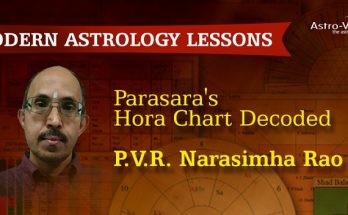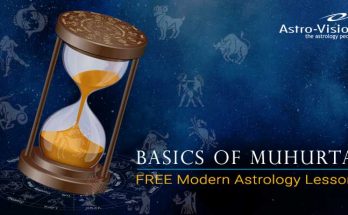The aim of astrology is to delineate the future course of events or trends. Sciences like futurology and meteorology also deal with the future. Statistical models are used to forecast future economic trends. People with clairvoyant powers can also look into the future.What distinguishes astrology from these other future-predicting subjects is that astrology considers the movements of the nine planets across the zodiac in making prognostications. The Purpose of this article is to generate a road map to make sound judgment of future events through astrology.
How Events Materialize
Events materialize when a strong causative factor is indicated by planetary movements. The fundamental principle on which the science of Astrology rests is the premise that all terrestrial events occur due to the impact of the movements of planets and other celestial bodies across the Zodiac. Planets tend to cause events by virtue of their position, their relationship with another planet as well as relationship with the house which signifies the event.Take the case of a birth chart with Scorpio as the rising sign and Mars, Mercury and Saturn occupying Virgo. The native could buy either a car or a house to live in an appropriate period or sub-period as the Ascendant, which denotes the phantom self conjoins the 4th lord (who denotes an asset such as a car, house etc) in the 11th (house of wish fulfillment) with the 11th lord in exaltation.
The events will occur only in the Dasas and Bhuktis of those planets which becomes strong signifiers of those events.The planets in transit is a strong causative factor in activating events. The event will occur only when the related lords either join or have a functional relationship in transit without the transit factor; the trigger for the event will not be there.
For any event to materialize, the key rule is that the event must be indicated in the birth chart. If the event in question is not indicated in the birth chart, planets appearing to be favorable in transit will not bring about the desired event.
Judgment of Houses
The following are to be factored in for judgment of houses:
(i) Lord of the house,
(ii) Occupant of the house,
(iii) Planets aspecting that house,
(iv)Karaka of the house,
(v) Sign dispositor of the lord,
(vi)Navamsa sign dispositor of the house lord.
Out of these factors, when a majority of the indications are present favorably, the events will materialize. Only strong planets can make the event materialize. Weak planets cannot. In this context, a quick reference to Varahamihira’s Brihat Jataka is worthwhile..
During the operating period of an auspicious planet, the mind of the person will be happy and healthy. It enables the person to get wealth and happiness. The results produced by powerless planets will be experienced only as thoughts or dreams.
Varahamihira says in another work of his on Yatra (travelling) VIII-22,
There is light in man, which is small and great by which the past, present and the future may be known and it is to this light that the name Atma is given.*
(* Brihat Jataka, Translated 1986, page 276. by B.S.Rao, 5th edition)
Varahamihira’s view is that the present state of one’s consciousness is the cause of one’s joy or sorrow. When the planets influence the consciousness, it accordingly tends to become either happy or sorrowful thus influencing the future course of events.
The events will occur only in the Dasas and Bhuktis of those planets which become strong signifiers of those events. By dividing the Dasa (major period) into 9, we get sub periods or the Bhuktis. Further subdivisions will yield Antara, Sukshma and Prana when the event could be predicted to within a small specified time. The planet in transit is a strong causative factor in activating events. The example of how the relationship among the lords of the 1st, 4th, and 11th houses can bless one with either a car or a house may be referred to again. The event will occur only when these lords either join or have a functional relationship in transit. Astrologers attach too much importance to transits of Jupiter and Saturn and in one way they are right without the transit factor, the trigger for the event will not be there.
Other Factors
Divisional Charts
To find out whether a house is beneficial or not, a snapshot test can be done. Take the question of whether one will get a decent job. Take the three charts, namely Rasi, Navamsa, and Dasamsa. Judge where the l0th lord is placed. Note that the 6th, 8th and 11th houses are inauspicious. If the 10th lord is well placed in at least two out of the three charts one will get a decent job; if not, the answer is negative.
One vital point usually missed is the role of the Ascendant lord. If the planet which holds promise is unconnected to either the Ascendant or its lord, “the expected event will not occur. The benefit of a particular planetary placement must flow to either the Ascendant or its lord: if not, the holder will not experience the desired outcome.
Yogas
Yogas by themselves promise merely hold the promise of events. If other factors are favorable they support the event. But when either the periods or the sub-periods are adverse, they do not have the power, to overrule them. Merely because Gajakesari yoga occurs, aristocracy is not a guarantee. Likewise other Yogas cannot catapult a person to either name or fame on their own merit. Yogas belong to the category of either ardrida karma or Karma of an indefinite nature and cannot be totally relied on as a guaranteed indicator of events in a good chart; the Yogas bring about definite results thus augmenting the inherent power of the chart to yield beneficial results. Similarly, fortunes of a horoscope can be marred by an in auspicious yoga like sakata yoga, especially when the lord of either the period or the sub period indicates adverse results.
Quantitative Judgment
Prasna Tantra gives a rule to find out if an event will fructify or not. According to it, if the Ascendant is aspected by its lord -100% success; the Moon is unafflicted and the Ascendant is aspected by benefices or the Ascendant or its Lord is aspected by a benefic or the lord of Ascendant or at least two benefices aspect the Ascendant-75% success; benefices are in the 10th house or three benefices aspect ascendant or benefices aspect the lord of the ascendant -50% success; and the Ascendant is aspected neither by its nor by benefices – 25% success. These rules need to be taken note of by a diligent astrologer. They can imported into natal astrology and results deduced there from. Alternatively, while issuing a prediction, the above rules can be applied to the prevalent planetary position and results deduced there from.
Progressed Ascendant
One of the factors which bear significantly on the prospects of a year is the Muntha or Progressed Ascendant. This moves at the rate of one Rasi per year.-
The position of Muntha in the twelve houses in the progressed horoscope will give the following results.
First: Destruction of enemies, Gain of honor.
Second: Better income and greater happiness;
Third: Fame and good income;
Fourth: Sickness and mental affliction;
Fifth: Birth of issues and pilgrim age;
Sixth: Debts, diseases, and quarrel;
Seventh: Sorrow to wife and disappointment;
Eighth: illness and fear of enemies;
Ninth: Fame and prosperity;
Tenth: Fame and fulfillment of wishes;
Eleventh: Happiness and new friendships;
Twelfth: Expenditure, illness, and disappointments.
Apart from Muntha, the Lord of the house occupied by Muntha and varsheshwara year-lord will or influences the course of events. For a detailed discussion on this subject, the reader is referred to varshapal or the Hindu Progressed Horoscope by Dr. B. v. Raman.
Prof. B.S. Rao is known to have predicted world war 1, while his successor and grandson Dr. B. V Raman, who could be easily rated as the greatest exponent of mundane astrology, correctly anticipated the course of world war 2, His greatest prediction was the collapse of Soviet Union in 1987, which also coincided with the end of Communism as a political movement having originated in 1917 in the form of the Bolshevik revolution only Dr Raman could have foreseen its end in l987.
Mundane Astrology
Mundane astrology enables one to predict the future of the world. The Ascendant for all the capitals in the world is cast for the time of the commencement of the lunar year. The twelve houses in a mundane chart have the following connotations:
1. General affairs of state and public health
2. Treasury and Commerce
3. Telephones, railways, and airlines
4. Education, institutions, trade, agriculture
5. Birth of children, amusements, sports
6. Diseases, territorial attacks
7. Foreign relations
8. Death rate
9. Religious institutions
10. Ruler and parliament
11. Gains from trade
12. Hospitals, losses, budget expenditure
I will cite two examples to show how to read the mundane chart. If the lord of the 4th house is in the 12th, earthquakes are likely to hit a country. If the lord of the l0th house is in the 8th, the government can change. Predictions on weather and natural calamities can be made using the principles laid down by Varahamihira in Brihat Samhita.
Gayatri Devi vasudev is perhaps one of the few to have correctly predicted the end of the Rajiv Gandhi era and many world events in the editorials of The Astrological magazine and now, its successor Modern Astrology.
While making predictions about, say, whether one will win an election or not, both the natal chart and the mundane chart need to be interpreted. I would emphasize that mundane predictions are not just based on the mundane chart for the year, but on the overall, planetary implications arising out of the cumulative impact of the mundane chart and the directional influences and transits in relation to natal chart. Mundane astrology is not meant for beginners of astrology. It requires total mastery over the subject and special predictive skills.
Courtesy: MODERN ASTROLOGY (Author: Dr. E.S.Neelakantan Ph.D.)









